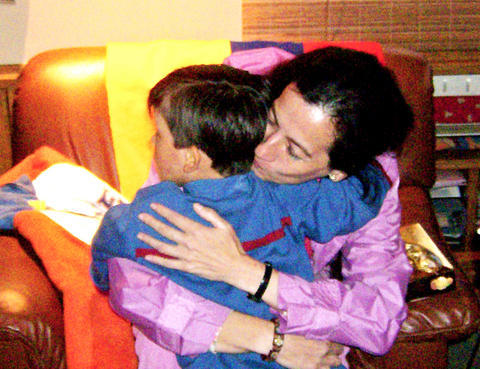After three years apart, recently released Colombian hostage Clara Rojas was able to embrace her young son, who was fathered by one of her guerrilla captors but taken away from her months after he was born.
Rojas gave birth to Emmanuel in 2004, but the guerrillas separated her from the child when he was eight months old. A peasant delivered him to Colombian social services, which -- unaware of his true identity -- placed him in a foster home in the capital, Bogota, where he has been for the past two years.
During the two-hour encounter at a foster home on Sunday, Emmanuel practiced drawing with markers with his mother at his side.

PHOTO: AFP
Photographs released by Colombia's child welfare agency also showed Emmanuel and Rojas in a close hug, their arms wrapped around each other.
Authorities have said they hope to deliver the boy to Rojas' permanent custody in the coming days.
Rojas earlier said Emmanuel had made her a gift, and they were shown apparently exchanging a paper with artwork on it.
Rojas returned on Sunday to Bogota nearly six years after she was kidnapped by the Revolutionary Armed Forces of Colombia, or FARC.
She was visibly emotional as she was greeted by the defense minister and chief peace negotiator.
"I am extremely moved to be back in my land. ... I feel like I've been reborn, I am back to life," Rojas said. But she added: "This is not a total happiness because many [hostages] remain and we are waiting for them."
The story of Emmanuel has transfixed Colombia since a Colombian journalist first reported in a 2006 expose book that the child was born to Rojas as the product of a consensual relationship with one of her captors, reportedly a rank-and-file guerrilla named Rigo.
Rojas, however, has not revealed much about Emmanuel's father. She said she does not know whether he is aware of Emmanuel and she had heard during her captivity that he may have been killed.
On Thursday the FARC handed over Rojas and another kidnapped politician, former congresswoman Consuelo Gonzalez, to a Venezuelan-led delegation which then moved the hostages to Caracas.
The FARC holds nearly four-dozen high-profile captives including three US defense contractors and French-Colombian politician Ingrid Betancourt, who was abducted alongside Rojas and remains with the rebels.
Shortly before Rojas' release, authorities discovered Emmanuel living in the foster home and guessed his identity based on what little was known about him, including that he had a fractured arm. DNA tests later confirmed their suspicions.
Rojas has worn a photo of her son around her neck since she was freed, and child psychologists showed the boy pictures of her before their meeting to try to ease the transition away from foster care.

Australia has announced an agreement with the tiny Pacific nation Nauru enabling it to send hundreds of immigrants to the barren island. The deal affects more than 220 immigrants in Australia, including some convicted of serious crimes. Australian Minister of Home Affairs Tony Burke signed the memorandum of understanding on a visit to Nauru, the government said in a statement on Friday. “It contains undertakings for the proper treatment and long-term residence of people who have no legal right to stay in Australia, to be received in Nauru,” it said. “Australia will provide funding to underpin this arrangement and support Nauru’s long-term economic

‘NEO-NAZIS’: A minister described the rally as ‘spreading hate’ and ‘dividing our communities,’ adding that it had been organized and promoted by far-right groups Thousands of Australians joined anti-immigration rallies across the country yesterday that the center-left government condemned, saying they sought to spread hate and were linked to neo-Nazis. “March for Australia” rallies against immigration were held in Sydney, and other state capitals and regional centers, according to the group’s Web site. “Mass migration has torn at the bonds that held our communities together,” the Web site said. The group posted on X on Saturday that the rallies aimed to do “what the mainstream politicians never have the courage to do: demand an end to mass immigration.” The group also said it was concerned about culture,

ANGER: Unrest worsened after a taxi driver was killed by a police vehicle on Thursday, as protesters set alight government buildings across the nation Protests worsened overnight across major cities of Indonesia, far beyond the capital, Jakarta, as demonstrators defied Indonesian President Prabowo Subianto’s call for calm. The most serious unrest was seen in the eastern city of Makassar, while protests also unfolded in Bandung, Surabaya, Solo and Yogyakarta. By yesterday morning, crowds had dispersed in Jakarta. Troops patrolled the streets with tactical vehicles and helped civilians clear trash, although smoke was still rising in various protest sites. Three people died and five were injured in Makassar when protesters set fire to the regional parliament building during a plenary session on Friday evening, according to

STILL AFLOAT: Satellite images show that a Chinese ship damaged in a collision earlier this month was under repair on Hainan, but Beijing has not commented on the incident Australia, Canada and the Philippines on Wednesday deployed three warships and aircraft for drills against simulated aerial threats off a disputed South China Sea shoal where Chinese forces have used risky maneuvers to try to drive away Manila’s aircraft and ships. The Philippine military said the naval drills east of Scarborough Shoal (Huangyan Island, 黃岩島) were concluded safely, and it did not mention any encounter with China’s coast guard, navy or suspected militia ships, which have been closely guarding the uninhabited fishing atoll off northwestern Philippines for years. Chinese officials did not immediately issue any comment on the naval drills, but they